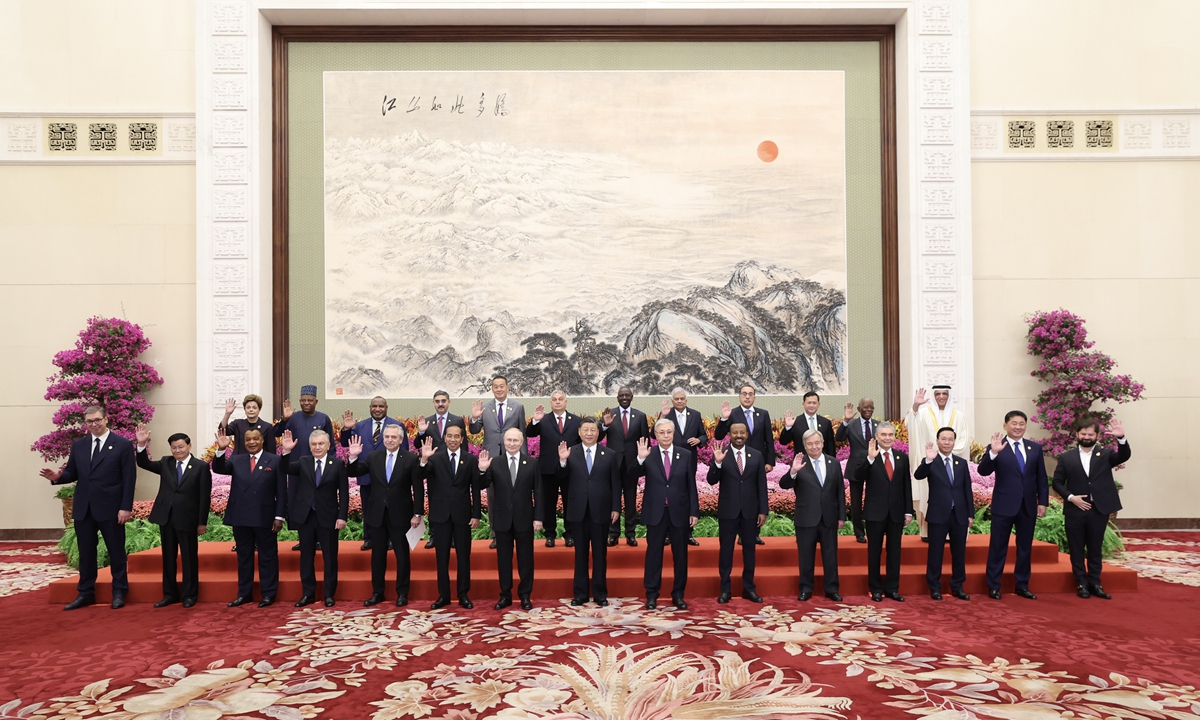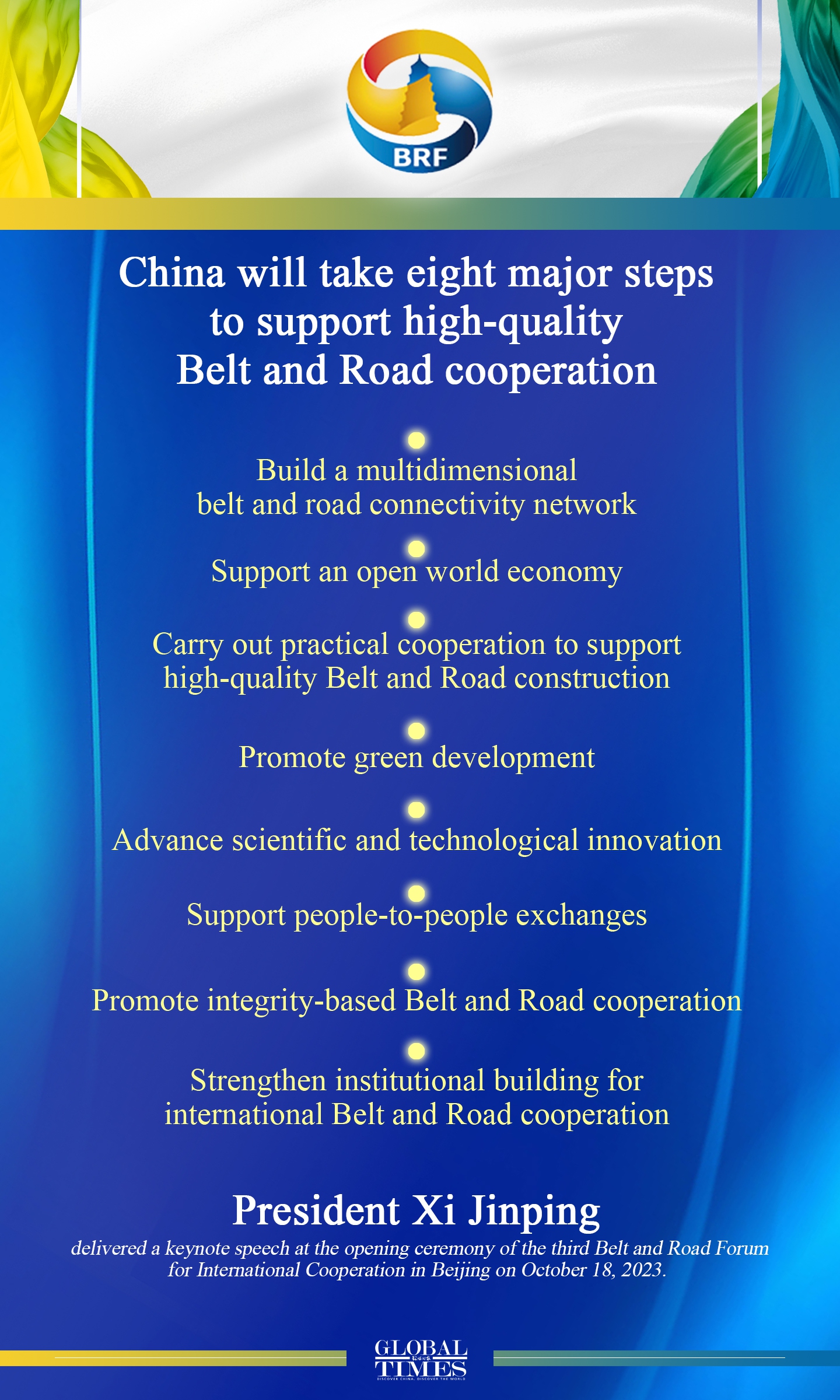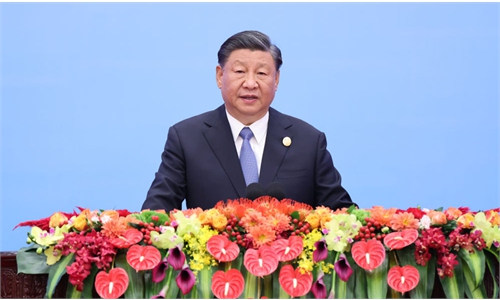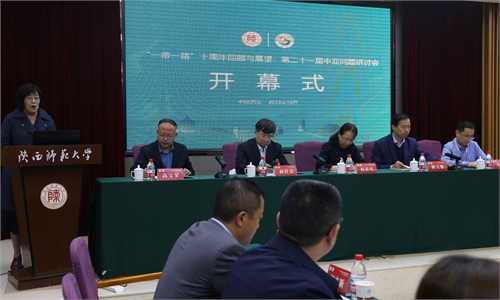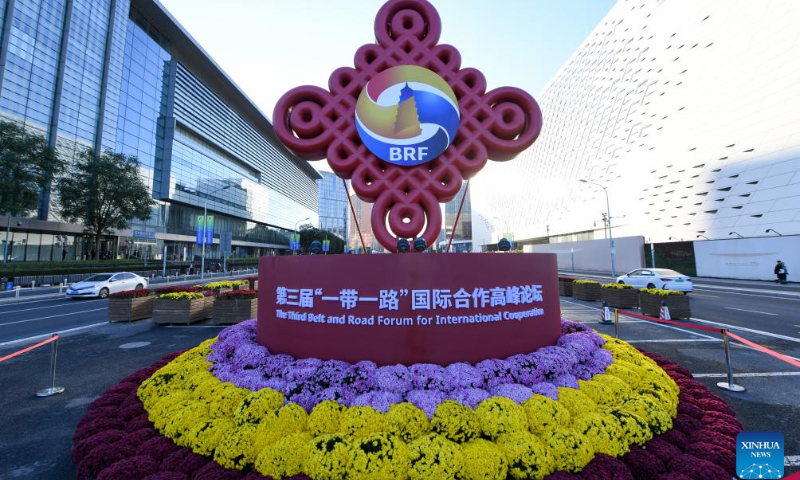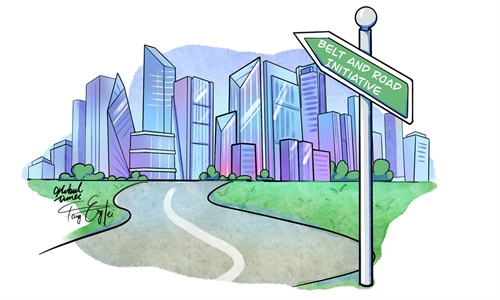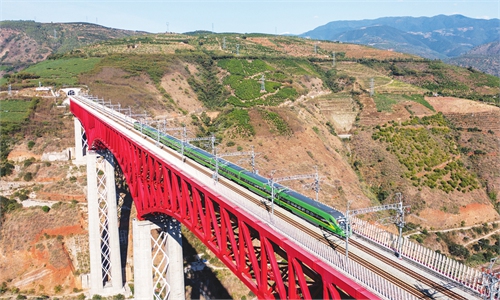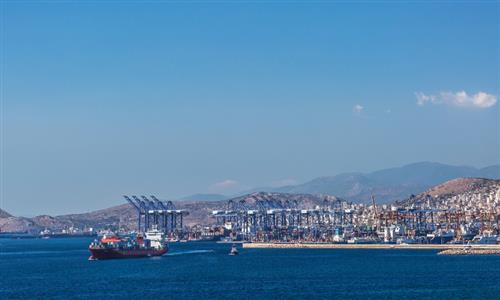BRI provides clear path for world in turbulence to restore ‘peace, development’
A foreigner is being interviewed by Chinese journalists in the media center for the third Belt and Road Forum for International Cooperation (BRF). The center started a trial run at the China National Convention Center on October 15, 2023.Photo:VCG
Amid turbulence as conflicts and bloodshed continue around the globe in countries like Palestine, Israel, Ukraine and Russia, members of the international community have never stopped seeking hope and solutions to make development sustainable, and maintain or restore peace and stability, with leaders and representatives from more than 140 countries as well as 30 international organizations arriving in China to participate in the upcoming Belt and Road Forum (BRF) for International Cooperation to be held in Beijing from Tuesday to Wednesday.
Chinese President Xi Jinping will attend the opening ceremony of the forum where he will deliver a keynote speech, and later hold a welcome banquet and bilateral events for guests attending the forum, according to the Chinese Foreign Ministry. The BRF this year will be held under the theme "High-quality Belt and Road Cooperation: Together for Common Development and Prosperity."
Kenyan President William Ruto on Sunday arrived in Beijing to attend the BRF, and Chilean President Gabriel Boric, who will also attend the forum, arrived in Chengdu, capital of Southwest China's Sichuan Province, to start his trip in China, the Xinhua News Agency and CGTN reported.
China Central Television aired an interview with Russian President Vladimir Putin on Sunday, with TASS reporting that this is an interview ahead of Putin's visit to Beijing. TASS said on Sunday that the Russian leader will visit China to attend the BRF as well as a China-Russia summit.
Great significance
"In 2008-2011, the world had just experienced the global financial crisis, and the developed economies had stagnated," Huang Renwei, executive director-general of the Fudan Institute for Belt and Road and Global Governance, told the Global Times on Sunday. "The flow of funds in the global economy as well as the mainstream of globalization had changed, so China had to search for new markets to change its old system that was heavily reliant on developed Western markets. This was the background against which China proposed the BRI in the first place," Huang said.
Through the BRI, China used its investments, technologies and infrastructure projects to link more and more developing countries which had been marginalized in the West-dominated globalization, Huang noted. "The initiative [BRI] is not just about building bridges and roads, but inevitably a phenomenon based on the changing of the world and China's economic structure."
Huang said that "the BRI is a historically significant, innovative and far-sighted move proposed by China. If the BRI hadn't been proposed 10 years ago, the recession in the global economy and market would have been severer, the economic damage caused by the COVID-19 pandemic would have been heavier, and the US launched trade war against and 'decoupling' from China will be more destructive."
To bring hope
Chinese analysts said the BRF will provide a thorough summary of the achievements and lessons of the past decade, and will discuss and conclude with a consensus and a significant plan about how to keep pushing the construction of the Belt and Road in the future. It seeks to improve and reform globalization and global governance, especially when world peace and development are facing serious challenges and global post-pandemic recovery is fragile.
The third BRF is the most important diplomatic event hosted by China this year, and the most significant celebration for the 10th anniversary of the proposal of BRI, said Chinese Executive Vice Foreign Minister Ma Zhaoxu on Friday.
Shen Yi, a professor of international relations at Fudan University, told the Global Times on Sunday that he hopes the upcoming BRF will be an event that "continues with the past and opens up the future."
"The world is in persistent unrest, as the ongoing Ukraine crisis and the latest Palestine-Israel conflict are bringing more uncertainties and bloodshed. After the COVID-19 pandemic, global economic growth lacks new impetus," he said.
The disadvantages and problems of the old US-dominated unipolar world order and West-dominated globalization have been exposed, and the world is asking for new solutions and more contributions from China, experts said.
"The BRF is expected to produce substantial outcomes, both in the form of cooperation documents, initiatives and mechanisms, and in terms of projects, funds and measures. The total number of deliverables is likely to exceed those of the previous two forums," Ma said.
"In this world of change and volatility, the BRF will showcase how the BRI, a Chinese initiative with international support, has delivered benefits to all, and present the new progress China has made in advancing major-country diplomacy on all fronts since the 20th National Congress of the Communist Party of China. It will send a message of solidarity and win-win cooperation of countries around the globe, and add positive energy and stability to the world," Ma told the media.
Li Haidong, a professor at the China Foreign Affairs University, told the Global Times on Sunday that the joint construction of the Belt and Road is a key part of China's idea of building a global community of shared future, and in the future, China will keep invest and promote the BRI to make it a better public good for the world, so that more countries are able to benefit from it.
'Don't be jealous'
Some Western media and politicians have always tried to badmouth and stigmatize the BRI, and very recently they said the forum has not seen participation by Western developed countries. Chinese experts said the arrogance of the West makes them fail to understand the BRI and fail to provide any meaningful alternative to compete with the BRI.
The China-proposed initiative has changed the world significantly, and compared to 10 years ago, more countries have participated in this initiative, so the BRI is successful and will keep being successful with or without the participations or the compliments from the US and its allies, analysts noted.
Huang said the US-led West's attitude toward the BRI was different according to the phase of the initiative: In the first two to three years after the BRI was proposed, the West downplayed and looked down on it as they did not believe China could afford to or effectively promote such a huge plan with so many uncertainties and risks. From 2018 to 2019, the West realized the influence and achievements of the BRI, so they started to badmouth and stigmatize the BRI, with the rumors like it being a "debt trap" and a manifestation of "China's neocolonialism."
"Since 2021, in order to compete with the unstoppable BRI, the US, the EU, Japan and India proposed global infrastructure initiatives as well. It's just like plagiarism. These attempts are mainly lip-services. They lack funds and they don't have enough investments. In some cases they have political conditions for their partners, or their infrastructure projects get delayed again and again," Huang noted.
Build Back Better World (B3W) is an initiative undertaken by the G7. Launched on June 12, 2021, it would provide "an alternative" to the China-proposed BRI for infrastructure development of "low- and middle-income countries," Reuters reported in 2021.
However, the B3W has not been mentioned by international mainstream media in the past two years. In 2022, the US and its allies created a new term "the Partnership for Global Infrastructure and Investment (PGII)" and US President Joe Biden unveiled "a proposed corridor linking India, the Middle East and Europe" at the G20 summit in New Delhi in September - and pledged there would be more corridors to come.
Due to the outbreak of war in Palestine, and the different stances among the West, India and the Islamic countries on the Palestine-Israel conflict, analysts said prospects for Biden's ambitious initiative is not optimistic at all.
China and the world welcome more participants to make joint efforts to boost global recovery and improve globalization, but those strategies which are exclusive and prioritize major power competition will never serve the demands of the world and will fail to win support from the majority of the international community, experts noted.
RELATED ARTICLES
The "21st Central Asia Issues Seminar: Review and Prospect of the 10th Anniversary of the Belt and Road ...
As US fans the flames of war, China exports peace and development with BRI
Illustration: Tang Tengfei/GT
The world seems to have been set ablaze by the flames of war that have broken out in the Middle East.
The re-emergence of the Israeli-Palestinian conflict demonstrates that the world is still in a transitional phase between the old and new epochs and has not yet moved beyond the post-World War II "order."
The ashes left behind by the old Cold War are beginning to rekindle, and the footsteps of the "new cold war" are clearly audible. The conflict in the Middle East has already reopened old wounds and may lead to larger-scale religious, ethnic, ideological and geopolitical disputes.
As peace and stability become more precious, what is the US doing as the prescriber and dominator of the post-war order? And what can it do for peace?
Despite the deployment of two carrier strike groups by the US, it appears unlikely that the nation, often referred to as the "world's policeman," will succeed in extinguishing the turmoil in the Middle East. Washington has even gone so far as to avoid saying terms like "de-escalation/ceasefire," "end to violence/bloodshed," and "restoring calm." According to the US media, the US State Department has asked diplomats not to use these terms. Additionally, the legislators, are eager to expedite the restoration of Congress' normal functioning to promptly facilitate the provision of additional weaponry to the "front line" of global conflicts.
Neither the US nor Europe can extricate themselves from a conflict that has deep historical roots in their expansion in the world. They face the resulting deep divisions in their societies and public opinion.
Most countries around the globe, especially in the South, in general, need stability and development and more solid forces to support peace.
Looking ahead from this perspective, the rise of China and the China-proposed Belt and Road Initiative are clearly of extraordinary significance. The Third Belt and Road Summit Forum on International Cooperation to be held in Beijing will give the world a clearer understanding of peaceful development.
As a force for joint development and an anchor of stability for global peace, China shoulders the responsibilities of an emerging power in this era of transition between the old and the new.
China does not have the historical burden of Western colonist powers' expansion. China remains impartial, refrains from fueling the fire, maintains neutrality and strives for peace. It encourages conflicting parties to escape the cycle of confrontation and conflict. This stance aligns with China's choice and is consistent with the universal concept of human rights.
Outsiders primarily view the Belt and Road through an economic lens. However, China's proposal of this initiative is not solely due to its financial strength but also because China has consistently pursued stable domestic growth and remained committed to the path of peaceful development. Only when all three are added together can it give the world's peaceful development a more decisive impetus. Even if the world is in chaos, China has the strength to maintain stability.
China's domestic political and social stability starkly contrasts the US' domestic political chaos, social division and polarization of public sentiment.
People can explain the Belt and Road from a geopolitical perspective, discussing Chinese manufacturing's global reach and China's domestic and foreign affairs. However, one core aspect is China's exportation of development and peace, resulting in a win-win situation.
When Washington does not mention the term "ceasefire" and tries to impose its own political choices on other nations, can it still be seen as the power prioritizing global peace and development?
The world cannot always dance to the tune of the US. When more countries view the Belt and Road Initiative (BRI) through the lens of the US perspective and take into account the conflict between Russia and Ukraine, as well as the Israeli-Palestinian conflict, it is expected that more countries will align their choices with the development trend of the new order.
Neither Europe’s political bias nor Western media’s demeaning reports can deny or blur the real economic benefits BRI ...
The China-Laos BRI cooperation has become a successful example of countries and regions participating in the initiative.
Beijing fully prepared for BRF; ‘world expects China’s answer to global challenges’
This photo taken on Oct. 14, 2023 shows a floral decoration for the third Belt and Road Forum for International Cooperation (BRF) near China National Convention Center in Beijing, capital of China. The BRF will be held from Oct. 17 to 18 in Beijing. (Xinhua/Ju Huanzong)
The third Belt and Road Forum for International Cooperation (BRF) will be held in Beijing from Tuesday to Wednesday, as the year marks the10th anniversary of the Belt and Road Initiative (BRI). Leaders and representatives of countries from around the globe and international organizations have arrived in China, and Beijing is fully prepared for this major home diplomatic event.
In recent days, floral decorations, flags and banners bearing slogans for the third BRF can been seen in many parts of the capital, and some foreign guests who came for the event told the Global Times that with so much bad news about wars, conflicts and chaos elsewhere, China makes them believe that peace and development are still the mainstream of the world, and they are confident that by working together, members of the international community will eventually find solutions to the global challenges.
More world leaders arrived in Beijing on Monday. Following Kenyan President William Ruto and Chilean President Gabriel Boric, who arrived on Sunday, foreign leaders including Indonesian President Joko Widodo, Serbian President Aleksandar Vucic, Cambodian Prime Minister Hun Manet, Lao President Thongloun Sisoulith, Sri Lankan President Ranil Wickremesinghe, Prime Minister of Papua New Guinea James Marape, Ethiopian Prime Minister Abiy Ahmed, and President of the Republic of the Congo Denis Sassou Nguesso have arrived in Beijing for the event, the Xinhua News Agency reported.
Russian Foreign Minister Sergei Lavrov also arrived on Monday. During his meeting with Chinese Foreign Minister Wang Yi, who is also a member of the Political Bureau of the Communist Party of China Central Committee, Lavrov said Russian President Vladimir Putin is very much looking forward to having a summit with President Xi Jinping in China and participating in the forum, expressing confidence over the success of the event, according to Xinhua.
The first press briefing of the Media Center of the third BRF was held at the China National Convention Center in Beijing on Monday. Officials of the International Cooperation Department of the Ministry of Natural Resources and other related departments were invited to brief the press and take questions from journalists of different countries, Xinhua reported.
Chinese analysts said the BRF will be a key and historic event, because the world is in turbulence and needs solutions and answers, and China, just like it has done in the past decade, will continue playing a role to guide and contribute to global development and governance when world peace and stability are facing serious challenges.
The BRI has distinguished China from traditional major powers. The BRI is a rejection of zero-sum confrontation, it is not even a "national strategy" by the traditional definition, nor a policy to serve the interests of only one country, said experts.
"In the past, many people asked what China's rise will bring to this world, and the BRI is an answer from China. The reason why more and more countries have become interested and participated in the initiative, despite some noises and stigmatizations from some Western politicians and media, is simple: It brings benefits to everyone," said Shen Yi, an expert on international relations and professor at Fudan University.
Some Chinese netizens said the world is thread-worn and China is sewing it up, which is a vivid and accurate metaphor.
The world today needs new answers, and this is why representatives of over 140 countries and 30-plus international organizations, including state leaders, heads of international organizations, ministerial officials and representatives of the business sector, academia and nongovernmental organizations are expected to participate the forum, said experts.
High expectations
Expectations for the upcoming BRF are high, with national leaders, former foreign officials, foreign scholars and representatives from foreign business communities all looking to hear about the remarkable achievements the BRI has made in the past decade and how the cooperation platform will lead to more opportunities and benefit more people.
"The important thing is the celebration of the 10th anniversary of BRI and a presentation of all the BRI projects which are valued at over $1 trillion in investment," Michele Geraci, former undersecretary of state at the Italian Ministry of Economic Development, told the Global Times.
"The forum will bring the BRI to a higher level of discussion, and really increase the image of the BRI in the eyes of many Western countries. And I also expect there will be discussions on the role of BRI in bringing peace to the world," he noted.
Mario Renduli, President of the Chinese Southeast European Business Association, told the Global Times on Monday that the increasing number of participating countries and organizations could "lead to a more diverse range of perspectives, experience and opportunities for collaboration."
Having been to the BRF's first and second editions, Renduli? noted that the third edition is "built on the progress and experiences of the previous ones," and is thus widely anticipated to serve a platform for countries to chart the future course of BRI, with a great emphasis on quality and sustainable development.
"I'm very interested in hearing about the latest investment themes at the summit, and analyzing how [my company] can provide support," Rani Jarkas, chairman of Swiss financial group Cedrus Group, told the Global Times. Having traveled to many BRI countries and witnessed firsthand the great work Chinese investors are doing to benefit local communities, Jarkas praised BRI as "an astounding success and a major catalyst for global economic development."
The global vision and strategy for BRI development for the next stage, set to be discussed at the forum, has also come under the global spotlight.
Mansoor Nadeem Lari, CEO of the India-based Silk Route Trade and Industry Development Corp, who is a third-time participant of the forum, told the Global Times on Monday that the forum can bring greater consensus for discussion on a post-pandemic way forward and create a workable plan for cooperation among BRI participating countries, to "fast-track global economic recovery."
Abid Suleri, executive director of the Sustainable Development Policy Institute, told the Global Times that he will be paying attention to the opening ceremony and keynote speech by the Chinese leader, from which he expects to learn about the measures and initiatives for enhancing cooperation and partnership.
"In the next stage, strengthening the synergy and coordination of BRI with other regional and global initiatives will be a focal point, with a view to promoting South-South and South-North cooperation," Suleri said.
Xi meets world leaders in Beijing as BRF kicks off; China's massive diplomatic event attracts global attentionChinese President Xi Jinping met with world leaders who came for the third Belt and Road Forum for International Cooperation ...
Deals on the 1st day of the 3rd Belt and Road Forum hit a record, highlighting foreign entrepreneurs' confidence in BRI
On the first day of the third Belt and Road Forum for International Cooperation (BRF), over 1,200 representatives from more ...
Chile expects to further promote BRI, aspires to engage in more projects: Chilean President
Chile is actively advancing the China-proposed Belt and Road Initiative (BRI) and aspiring to participate in more projects advocated by China, including lithium mining and solar energy, Chilean President Gabriel Boric said at a Chilean economic and trade event during his visit to China on Monday.
Building the BRI, the majority of countries vote with their feet: Global Times editorial
When China hosts an event, it has always emphasized the practical results. The spirit of hard work is also reflected throughout the entire process of jointly building the "Belt and Road." The initiative, from its inception to its growth, from its initial stages to its comprehensive implementation, demonstrates its inherent vitality and resilience, and has already formed an irreversible momentum.
On a summer afternoon this year, bridge cranes were in constant movement, loading and unloading massive cargo ships ...
RELATED POST






